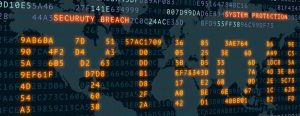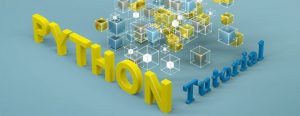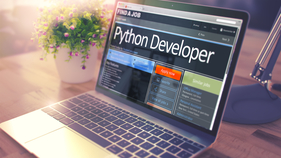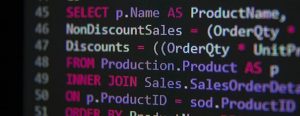
If you asked the average person what they thought of Python, you’d probably find yourself on the receiving end of an odd look and a pointed question about whether you like snakes. But direct that same query toward a programmer, and you’ll probably get a friendlier response.
You see, in a coding context, Python isn’t a scaly creature — it’s one of the most popular programming languages used in back end development today. In this article, we’ll address why learning Python is beneficial for aspiring developers, provide an overview of the language and further address how understanding it could benefit you professionally.
In this article, we cover:
- Why Learn Python?
- Introduction to Python
- Python Projects
- What Is Python Used For?
- Tips for Learning Python as a Beginner
- What Else Should I Learn?
- Python Articles
If you want to learn job-ready skills for a career in web development or data analytics check out the coding bootcamp or data analytics bootcamp options.
Get Program Info
Why learn Python?
If you plan to be a coder or data analyst, you’ll need to have some Python savvy. Python is well-loved among industry professionals for its flexibility, versatility and intuitive design. Despite being a high-level language suitable to addressing complex tasks, the language is remarkably easy to learn and use. It’s widely used in data science and can be applied to a variety of front and back end web development projects.
Plus, employers love it; according to a 2020 survey from HackerRank (PDF, 2.8 MB), Python is the second-most sought after language by hiring managers, after JavaScript.
If you want to code efficiently and effectively across professional disciplines, Python is your best bet.
Skills covered in these tutorials:
- Basic Operators
- Loops
- Conditions
- Functions
- Classes & Objects
- Modules & Packages
Introduction to Python
Before you launch into learning the basics of Python, you should familiarize yourself with the basic terminology and concepts you’ll run into during your first lessons. These include but are not limited to:
- Object-Oriented Programming
Python is an object-oriented programming (OOP) language, which means it relies on data structures called objects, each of which can contain a combination of information (data) and coded procedures that determine the actions an object can take. OOP languages are well-known for being scalable, efficient and collaborative; they tend to work well in expansive or complex projects.
- Operators
Python coders use operators to execute operations on values and variables. There are six major operators in the language. These include arithmetic, which performs basic mathematic operations like addition or subtraction; relational, which compares values and returns “true” or “false” according to a set condition (i.e., “true if left value is higher than right”); and logical, which perform AND, OR and NOT operations. The other three are bitwise operators, which perform bit-by-bit operations; assignment operators, which assign values to variables; and special operators, which perform complex operations.
Basics for Python
As you familiarize yourself with beginner Python concepts, you’ll need to understand more technical and practical aspects of the language, including how to install it and review its basic syntax. Additionally, you should endeavor to integrate programming exercises and free tutorials into your early education to help cement your new knowledge and give you opportunities to practice.
1. Installing
Before you can use Python, you’ll need to download and install an interpreter. Don’t be intimidated — this process is simple and easy, and many newer computers (namely HP) come with Python installed. If you need to check whether you have Python installed or need to verify the version you’re using, simply enter “python” in a command-line window. Doing so will prompt a Python interpreter to respond; you should see a version number in the initial display if you already have Python installed.
If you don’t have Python on your computer, you can venture over to the Python website and download a version that suits your needs and operating system (OS). Keep in mind that the version you download and install will depend on the OS you use.
2. Learning the Basic Syntax
Before you can learn how to program in Python, you need to familiarize yourself with the language’s syntax. With its focus on readability and concision, Python is usually relatively easy for first-time coders to learn. Below, we’ve listed a few critical components of the language’s syntax.
Comments
Comments exist outside of the code itself and are ignored by the Python interpreter and are denoted with the # symbol. You can use comments to provide insight to other programmers or leave helpful notes for your own reference. That said, it’s good practice to keep such comments under 72 characters and use them sparingly.
Keywords
All programming languages feature several keywords that are designed to facilitate certain actions and processes. These keywords play specific roles in Python’s syntax, so you should not use them for anything else, including variables. To view a full list of Python keywords, you can enter this command: >>> help(“keywords”).
Built-in Data Types
Python features several built-in data types which can be manipulated via operators and other functions. The data types Python uses include dictionaries, strings, numbers (including integers, floats and complex numbers), Booleans, sets, lists and tuples.
Loops
Python offers two kinds of loops (for loops and while loops) for when code repetition is necessary. You may need to repeat a portion of the code to obtain a specific result. Loops make that process simpler; you can use the two loops in Python to make code repeat a certain number of times or until a specified condition is met.
Variables
Variables are defined as names that programmers attach to objects to make accessing those objects easier. Single-character variable names are discouraged in favor of more descriptive names that provide context to the referenced data.
Conditionals
Commands that fall into this category assess whether defined conditions are met and adjust a program accordingly. These commands tend to feature statements such as “if” and “if else.”
Functions
Defined by the “def” keyword, functions are pieces of code that are dormant until the program commands them to run. These code blocks use parameters to define their input and produce data as an output.
Obtaining a fundamental understanding of Python syntax is essential for anyone who wants to master the language.
3. Try a few basic programming exercises
Once you become familiar with the language, you will benefit from tackling some programming exercises to practice your Python skills and solidify your knowledge. Here are some Python practice problems and activities you can try as you continue your education:
- Convert temperatures from Fahrenheit to Celsius (and vice versa)
- Calculate the average value of an integer set
- Implement a binary or linear search
- Find Nth term in the Fibonacci sequence
- Print all items in a dictionary
- Check if a string of numbers is a palindrome
- Identify the correct date and time
- Solve math problems like the Tower of Hanoi or Sieve of Eratosthenes
Naturally, you can manually accomplish some of these challenges, but the point of these exercises is to expand your knowledge of Python syntax through hands-on practice.
Get Program Info
Projects to try on your own
Once you are familiar with Python syntax and are comfortable completing exercises and practice problems, you can start working toward taking on your own projects. Doing so will be excellent practice and can help you build a professional portfolio! Below, we’ve listed a few tasks you can try.
- URL Shortener — Managing lengthy or unruly URLs can be a pain, so URL shorteners are terrific resources that make URLs look more appealing without detracting from their functionality. You can use Python to create your own URL shortening program.
- Text-Based Adventure Game — While somewhat simple, this project is one of the most exciting beginner-level challenges new Python coders can try. Essentially, you create an adventure game that solely uses text to facilitate movement and action. With this project, be sure to include movement restrictions and a tracker to track user movement through the settings you create, as consistency is key.
- Random Password Generator — Strong, unique passwords are crucial for online security. A random password generator that takes input from users and generates secure passwords from that data is a productive and worthwhile Python project to tackle.
- Digital Post-It Notes — Creating a virtual version of sticky notes to track miscellaneous thoughts and agenda items is a great intermediate Python project.
- Typing Speed Test — This project aims to create a program that calculates a user’s typing speed. The program could also display speed, accuracy and words per minute (WPM). You can use web-based source code for typing test programs online to make this project more efficient.
- Expense Tracker — This project uses Python libraries like Panda or Matplotlib to create a software application that allows users to track their expenses and develop insights into their spending or saving habits.
Tackling projects like the above can help you turn your theoretical Python knowledge into practical skills!
How long does it take to master Python?
Because Python places such a high focus on readability, it is often considered easier to learn than some other languages. Learning the fundamentals of Python without any prior knowledge or experience can take as little as two weeks.
However, mastering the language can take much longer depending on your goals and the resources you decide to use. You may spend months or years working toward complete mastery, especially if you are committed to learning how to use relevant libraries and frameworks in addition to the language itself. The learning process takes time, but if you set specific goals, stick to a schedule and stay focused, you can achieve at least a fundamental understanding of Python within the span of a few weeks.
If you want to speed up the process, you may want to consider enrolling in a coding bootcamp. These intensive programs are designed to teach aspiring developers job-ready skills and languages in as little as three to six months. Beyond learning Python, you could pick up fluency in other marketable languages such as HTML, CSS and JavaScript. If you’re looking to break into the job market quickly, the bootcamp track might be your best bet!
What Is Python Used For?
Python is one of the most in-demand programming languages (PDF, 2.8 MB) on the market today and is used in a variety of industries. These include (but are not limited to) sectors such as finance, tech, government, social science and business.
Industries that use Python
Below, we’ve highlighted a few jobs that would require — or at least strongly recommend — Python fluency.
1. Web development
Before the introduction of Django — a development framework designed to support Python projects — Python was more prevalent among software programmers than web developers. However, Django’s utility has turned Python into a fantastic web development tool; today, big-name sites like Pinterest and Instagram even use it for their back end development.
2. Data analytics and data science
When it comes to accessing, organizing and visualizing data (data analytics), Python tends to be the language of choice. For example, Python-based tools like SciPy and NumPy are instrumental in drawing numerical insights from user data. The tools that cooperate with this language are popular primarily because of how easy to use and scalable they are.
3. Artificial intelligence (AI) and machine learning (ML)
Some Python libraries have been explicitly designed to classify and analyze large data sets, and in the AI and machine learning industries, such algorithmic capabilities are essential. Thus, Python is considered a standard language for extrapolating and analyzing data pertaining to AI.
4. Fintech and finance
Python is one of the most popular languages in the fintech industry. Moreover, given that the industry is projected to continue growing due to a rise in mobile banking and cryptocurrency, aspiring programmers would do well to consider learning Python if they want to secure fintech roles.
Get Program Info
Careers that use Python
Within and beyond these industries, Python’s versatility and readability make it accessible and adaptable for a variety of professional roles. Here’s a look at some of the specialized roles that require a solid grasp of Python and their associated duties.
1. Software engineer
As their title suggests, software engineers are responsible for creating, testing, debugging and launching software and software solutions. The projects that a software engineer completes will vary depending on their employer’s needs and can include everything from developing operating systems and robots to designing games and desktop applications. Python is one of the most popular languages to use in software engineering, and its various tools, libraries and automation capabilities make it an asset in this career.
2. Data analyst
Analyzing large amounts of data, identifying trends and patterns and conveying this information through clear and concise means are all critical aspects of the data analyst role. As mentioned previously, Python and related tools are excellent for accessing, organizing, manipulating and analyzing data, so applicants to data analyst roles should be proficient with Python.
3. Data scientist
While similar in some ways to the data analyst role, data scientists have a more technical and demanding role. These professionals use their statistical, analytical and programming skills to interpret large data sets and draw data-backed conclusions that can inform their employers’ strategic decision-making. Given its utility and ubiquity in data analysis, all data scientists should have a baseline understanding of Python.
4. Application developer
Like the software engineer role, an application developer is responsible for writing and translating code into functioning programs and applications. With popular apps like YouTube and DropBox using Python to function, it makes sense that aspiring application developers should strive to master the language, as well.
Tips for Learning Python as a Beginner
Learning a programming language like Python can feel intimidating — but with proper guidance, discipline, resources and practice, you can increase your knowledge and master the language. Here are a few tips to guide your study.
1. Set specific goals
Whether you are learning Python as a hobby or aiming to make a significant career change, setting specific goals to guide your education can help give you direction and establish a workable timeline. If you are interested in a particular field or career, you can focus on industry-specific Python tools or projects to better prepare you for your future.
2. Study the syntax
Before you start coding, you need to learn and memorize the Python syntax. Fortunately, studying and mastering the syntax does not typically take too long — but you’ll need to dedicate time and energy towards facilitating a strong understanding of the language’s rules and operations.
3. Match your learning method to your goals
Your approach to learning should align with your goals. Think of it this way: while taking advantage of free tutorials and online resources can be immensely beneficial for hobbyists who want to brush up on their coding skills for fun, independent study isn’t ideal for those who need to learn quickly.
Formalized learning can only do so much. If you want to add Python to your professional skill set or start a coding career, you may want to consider enrolling in a formal program like a coding bootcamp. Coding bootcamps will provide you with an immersive learning environment that will help you pick up marketable programming languages — including Python — quickly.
What Else Should I Learn to Complement My Python Skills?
If you aim to enter an industry or role that benefits from a mastery of Python, you may want to supplement these skills with additional proficiencies to boost your marketability and competitive edge.
Studying web development is an excellent complement to Python skills because many websites and applications utilize the language in back end development. Creating functional, user-friendly sites is a primary objective of web developers. Those who are hoping to enter the web development industry may also benefit from learning HTML, CSS and JavaScript to aid in web page creation and design.
Python students may also consider learning how to use Node.js for web application development, Django for website building or Bootstrap for front end development through frameworks and plug-ins.
If you are considering entering the web development industry, full stack development is a promising pursuit; rather than focusing on back end or front end development, full stack developers can manage both areas of development, making them more competitive in the industry.
If you want to acquire the skills necessary to succeed in programming or development, you may want to consider enrolling in a coding bootcamp for an accelerated, intensive and comprehensive experience. Or, if data analytics is more your speed, consider signing up for a data analytics bootcamp instead.
Want to learn more about how a bootcamp experience can teach you job-ready skills? Contact us today!
Navigate Python Articles
From the basics to more advanced coding techniques involving Python.
Get Program Info
Ready to learn more about Berkeley Data Analytics Boot Camp in San Francisco? Contact an admissions advisor at (510) 306-1218.
 Live Chat
Live Chat




